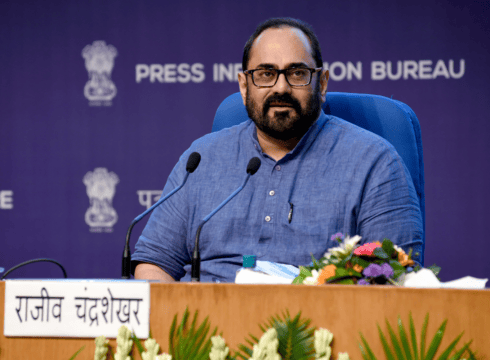The online gambling law enacted by Tamil Nadu has created a regulatory minefield of uncertainty, ambiguity and confusion, said MoS Chandrasekhar
Its amendments specify betting and wagering as user harm and as such it was a no-go-area for gaming intermediaries, added Chandrasekhar
MoS IT’s statements come days after Tamil Nadu promulgated its own law that bans online gambling and specifies hefty fines for indulging in such games
Inc42 Daily Brief
Stay Ahead With Daily News & Analysis on India’s Tech & Startup Economy
In what could invite sharp criticism from detractors, Minister of State (MoS) for Electronics and Information Technology Rajeev Chandrasekhar on Friday (April 14) said that it was meaningless for states to regulate online gambling as the internet came under the purview of the Centre.
“… the basic principle for what online gaming permits has been established (via IT amendments). The Internet can’t be regulated by states so, in some aspects, it is meaningless for a state government to try and legislate things that are happening on (the) Internet even if they have law and order under their control,” said Chandrasekhar during a Twitter Live.
This is probably the first time that the Minister has spoken on the matter which has seen a covert tussle between states and the Centre on the regulatory front. While the Centre unveiled new IT amendments earlier this month, covering online gaming space, Tamil Nadu (TN) followed it up with a full-fledged law that banned online gambling altogether.
Called the Tamil Nadu Prohibition of Online Gaming and Regulation of Online Games Act, 2022, the new law received assent from the Governor earlier this week and mandates a fine of up to INR 5,000, or even imprisonment, for participating in gambling online.
Terming the recently promulgated TN law on online gambling, in a way, ‘loft’, Chandrasekhar said that it was ‘making all these complex nuances about games of chance and games of skill, which is not the issue today’. He added that the betting was the byproduct of whether there was wagering on the outcome of a game.
Citing his rationale, the MoS added, “… Whether that game is a game of skill, or a game of chance does not matter, you could still be playing chess, and if there is a provision to bet on the outcome of a game of chess, it is still betting, regardless of whether the underlying game is a game of skill.”
The MoS also said that the law enacted by Tamil Nadu had created a regulatory minefield of ‘uncertainty, ambiguity and confusion’.
However, he also said that, with IT amendments, the Centre was looking at regulated betting in the overarching Indian context, adding that the states were free to do more on top of that.
“… If they (the states) want to say like, look, as a gamer in the X state, we also don’t want you to do ABCD and that will fall afoul of our local laws. They’re free to do that,” the minister added.
Taking potshots at critics, he said that some states, organisations and lawyers ‘deliberately or not so deliberately’ have created a tremendous amount of confusion and made the IT amendments, covering the online gaming space, a lot more complicated.
Speaking virtually, the minister also noted that the new online gaming rules were built with the mandate to ensure the Internet in India is safe, and trustworthy and mitigates user harm. Elaborating further, he said that the new norms underline betting and wagering as user harm and as such it was a ‘no-go-area’ for gaming intermediaries.
He also said that the new online gaming norms envisage a clear crystal framework for states, courts and gaming companies about what was permissible under the new regime.
Reaffirming the government’s stance on offshore betting platforms, the MoS IT said that platforms domiciled in the British Virgin Islands or Cayman Islands that do not adhere to local norms would not be allowed to advertise on the Indian Internet.
This comes a week after Chandrasekhar held a meeting with executives of online gaming companies where these platforms also flagged issues related to the superimposition of regulatory norms between the Centre and state and sought clarification on the matter. The platforms had then also cited concerns around ‘prosecution or probes’ by state governments while adhering to central guidelines.
Meanwhile, industry players under the umbrella of the All India Gaming Federation have publicly said that they will challenge the constitutionality of the TN law once it is notified.
The move is expected to exacerbate problems for the online platforms and could see them burdened with double compliance. Despite the hiccups, the space is headed for healthy growth and is projected to surge to a market size of $8.6 Bn by FY27.
{{#name}}{{name}}{{/name}}{{^name}}-{{/name}}
{{#description}}{{description}}...{{/description}}{{^description}}-{{/description}}
Note: We at Inc42 take our ethics very seriously. More information about it can be found here.


